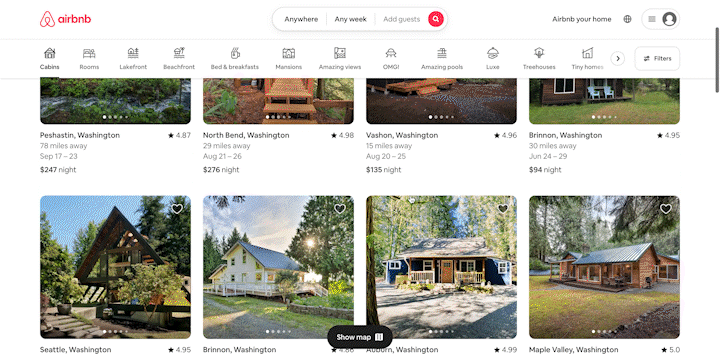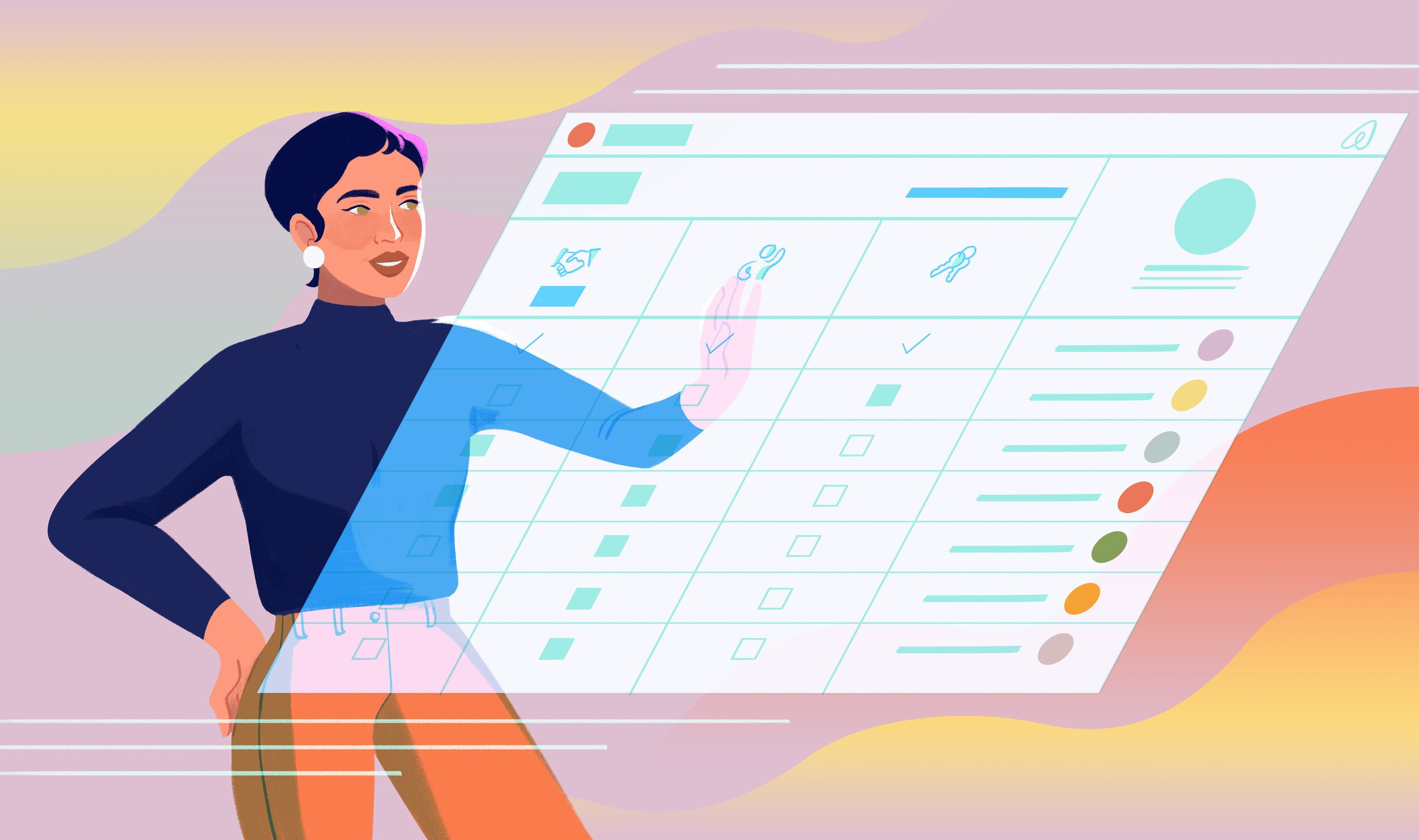Project Overview
This project was referred to as the Blue Star project. Our professor gave us a prompt to work on, and as we proceeded with the design, we got to decide whether to change direction ("pivot") or persist with the original objective. Ultimately, we needed to showcase our final design that addressed the given prompt.
Timeline: 11 weeks (Winter 2023)
Project Type: Class Project (INFO 498: Applied Product Design)
Team: Anna Shi, Delaney Edwards, Emily Song, Keiver Bencomo, Pranav Shekar
Programs Used: Figma, Pitch
My Role: UX Designer, UI Designer
Methods: Interaction Design, User Research
Initial Prompt
"Airbnb is exploring the idea of creating a Passport service, allowing subscribers to be able to travel around the world via multiple Airbnb stays, or be digital nomads, working remotely at various locations. They need help defining the product, including positioning and design."
What does “passport” mean to us?
Before jumping into our project, we aimed to understand the prompt's significance. Following brainstorming and presenting our ideas to each other, we identified themes that encompassed the possible meanings of a passport.
Something that tailors digital nomads’ travel experience?
Something that helps digital nomads find community?
Something that streamlines the travel process?
Where is the travel industry right now?
After gaining a basic understanding of the potential scope of a passport, our focus shifted toward understanding the problem space. To achieve this, we conducted market research to gain insights into Airbnb as a company and the current state of the travel industry, approximately a year after the onset of the COVID-19 pandemic.
total global employment comes from the travel industry
10%
of travelers chose a destination suggested by family/friends in favor of the experience
Users spend more but go on fewer trips
27%
Airbnb reported the following user trends in their 2022 annual report:
Long-term stays are increasing
Need of flexible dates of travel
2X
increase in booking long-term stays in 2022 compared to 2019
Demand of unique housing experiences
Who are our stakeholders?
We created two user types to represent our stakeholders. We chose this approach over user personas because user types offer simplicity, flexibility, and scalability, making them suitable for our large user populations.
Digital Nomads
"I’m looking for a place to stay in the middle of Barcelona that has good internet connection so that I can stay on top of my work. When I'm not working, I hope to practice my Spanish with some locals!"
Airbnb Hosts
"I want my Airbnb to become home to the right people so they can try out longer stays and my bookings can be consistently filled."
Before creating these user types, we interviewed two digital nomads and an Airbnb host. These user types continued to evolve and change as we further explored and understood our stakeholders.
*Based on user research
Wants:
Access to wifi
Access to amenities
Co-working spaces
Affordability
Visas
Wants:
Longer stays
Discoverability
Comfortable workspace
Experiences
Change of lifestyle
Pain points:
Timezone differences
Personal Safety
Increased bookings
Consistent turnover
Pain points:
Property damage
Safety of their guests
Community
Work-life balance
Loneliness
Concept One - AirNomad
Our 8-minute ideation session and secondary research led to a rapidly prototyped exploratory version of Airbnb to address the needs of digital nomads: A browsing experience that allows users to find Airbnbs that match their work and life needs while traveling the world.
AirNomad supports users with:
Features included:
recommendations from other nomads
Matching Preferences are highlighted
Details about the workspace are included
Summary of multiple bookings within a trip
Finding co-working spaces
Forming Community
Providing a work-life balance
Validating Concept 1 through user interviews
We conducted our second round of interviews to validate our concept. We interviewed eight travelers to identify travelers' concerns and ideal travel experiences.
Takeaway 1:
Our initial hypothesis about community-building being a pain point was incorrect
Takeaway 2:
Research showed that travelers are mostly having trouble with the booking experience
“I want to be able to do all my planning in one place without having to switch between services”
Takeaway 3:
Planning and comparing options takes a lot of consideration and time
both digital nomads and general travelers face information overload when planning a trip
Takeaway 4:
Users want all the travel information needed to plan their trip in a single platform
This research helped us shift away from digital nomads as they experience similar pain points to other travelers:
Information overload in the booking experience.
The pivot point ⤵️
Updated Problem Space
"Airbnb is exploring the idea of creating an assistant service that minimizes information overload for travelers. With a personalized booking experience, these travelers will find cities and Airbnbs that best suit their travel needs and desired experience."
Where do users experience information overload when using Airbnb?
Airbnb users face information overload in various areas, such as search results, listing descriptions, reviews, communication with hosts, and neighborhood exploration.
To address this, Airbnb offers filters, sorting options, and user-friendly interfaces, but the abundance of information remains a challenge for users.
Ratings Aggregators: Concise overviews of user reviews and ratings.
Travel Agent:
Expert assistance in planning and booking personalized trips.
Smart Filters and Super Filters: Advanced tools to refine search results quickly.
Are there current solutions for information overload?
During our brainstorming session, we explored potential solutions to address the issue of information overload, both in general and within the travel industry. We focused on identifying features, services, and products that could help support this problem.
Trip Planning Tools: Comprehensive tools for organizing travel details.
Artificial Intelligence Chatbots:
AI-powered assistants for personalized guidance.
Personalized Recommendations: AI-driven suggestions tailored to your preferences.
AI-Powered Content Filtering:
Personalized content delivery based on preferences.
How can we utilize all these features to streamline information for users?
01
02
AI Travel Agent
A natural language AI Agent that helps users plan trips and streamline suggestions with the following features:
03
Uses Airbnb's data to provide accurate information about bookings and Experiences
Gives users simplified recommendations based on their needs and preferences
Answers users' travel and Airbnb questions in a conversational manner
What relationship will the user and the AI Travel Agent have?
User First
A user-first conversation-style interaction where users can engage in real-time with a chatbot
People were hesitant about using chatbots because of their previous experiences (inaccuracy and long interactions)
(Insights from user interview)
Recommendations-First
A recommendations-first survey style that filters to suggest places and experiences based on selected preferences
People found the survey approach to be more accurate but it might not be personalized enough and too rigid
(Insights from user interview)
Digging deeper into functionality
Scripting
We wrote a script that would demonstrate the most complex conversation a user might have in order to further develop our product experience. This allowed us to think through a variety of use cases and potential message types that the AI travel agent could send.
Wireframing
We then considered the features and entry points of this AI chatbot, including how the different interactions might look, how to present information, and how to onboard users.
However, when we introduced the power of ChatGPT and encouraged them to play around with it, users were excited about the potential of an AI travel agent.
Validating AI Travel Agent through user interviews
Initially, users weren't thrilled with the idea of a chatbot travel agent, because of previous experiences with cumbersome customer service chatbots.
Takeaway 1: Citations
Users want sources cited when presented with recommendations outside of Airbnbs and booking.
Takeaway 2: Bookings
Users don't trust booking through a chatbot, instead they prefer booking on their own in a new tab.
Takeaway 3: Personalized
Users are excited by the possibility of more personalized travel recommendations.
After talking to our mentor, we realized we had fallen into a common product design obstacle.
From here, we refocused on crafting an MVP for AI integration into Airbnb. We knew this was a valuable product experience from our research and reflected on how it could add value to the existing Airbnb ecosystem instead of recreating Airbnb.
We had remade Airbnb in our chat agent. As we developed our solution, more and more use cases arose, prompting us to keep integrating them into our chat agent.
Introducing, Airbnb Agent
To enhance the current Airbnb experience, we developed an improved concept that serves as a personalized AI travel agent to guide users throughout their browsing experience.
Our refined concept acts as a super-filter, helping you narrow down search options based on your search inputs, even if they are not traditional Airbnb "filter" words—nightlife, parts of the town, activities, etc. It can also suggest a city and activities that fit your interests and travel habits.
Reflection
Over the past ten weeks, we experienced how nonlinear the design process can be. This project illustrated how to work with an ambiguous design challenge and utilize user research to make human-centered decisions. With our findings, we feel confident that Airbnb Agent is a strong product experience that would take Airbnb to the next level.
We received 5 stars from industry professionals on our execution.
Future Airbnb Agent Iterations
Include super-filter pills in the global Airbnb UI
Update Airbnb map to highlight specific neighborhoods and locations that are being discussed
Compare multiple Airbnb listings that match a user's preferences




















